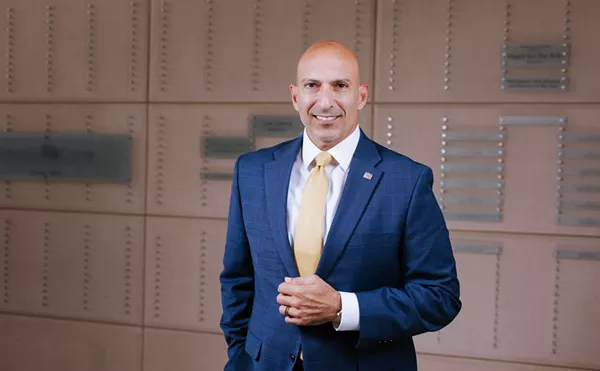The Satanic Temple filed a lawsuit against Texas alleging certain state-mandated abortion regulations violate the religious liberty of its members. They say regulations, such as those that require women seeking an abortion to undergo a sonogram and examine the results, read about abortion and sit-out a mandatory waiting period, violate the temple’s religious teachings.
The Satanic Temple, which describes itself as a nontheistic branch of Satanism, wants its followers to be exempt from such regulations. The temple has members across the country, including in Texas.
It's legal to get an abortion in Texas. But the procedure is banned after 20 weeks unless a life-threatening medical condition is involved or the fetus has a severe abnormality. If a person is eligible, the state requires them to get a sonogram and receive paperwork about medical risks, adoption alternatives and developmental stages of the fetus. According to the ACLU, some of the information provided in this paperwork is false.
The state then requires a woman to wait 24 hours after receiving the sonogram and paperwork before she can go through with the abortion. The day-long wait is not required if for those who live 100 miles or more away from the nearest abortion provider.
But the temple's members consider abortion a ritualistic process, according to co-founder and spokesperson Lucien Greaves. The ritual is meant to take the shame and guilt away from the person receiving the procedure, affirming their choice. The state regulations disrupt this ritual, Greaves said.
“We have a distinct kind of procedure for this, and in no part of this do we include getting sonograms or any other medically unnecessary acts as are required in Texas,” Greaves said. “Therefore, the imposition of those things, we feel, is a violation of our religious liberty.”
The ritual goes like this: Before the abortion takes place, surgically or medically, a member of The Satanic Temple will look at her reflection, be reminded of her personhood and responsibility to herself, take deep breaths, focus on her intent and make herself comfortable. When ready, she will say the third and fifth tenet of the temple aloud.
The third reads: “One's body is inviolable, subject to one's own will alone.” The fifth reads: “Beliefs should conform to one's best scientific understanding of the world. One should take care never to distort scientific facts to fit one's beliefs.”
If receiving a surgical abortion, the individual would complete these steps before receiving anesthetics or sedation. Afterward, she would return to her reflection and cite her personal affirmation: “By my body, my blood. By my will, it is done.”
In recent years, the Satanic Temple has pursued two similar lawsuits in Missouri. It wasn’t sonograms in Missouri they were fighting, but rather the state’s informed consent law. This law includes requiring someone seeking to get an abortion to receive and read state-mandated materials that “stated the religious opinion that getting an abortion kills a unique and distinct human life,” Greaves said.
An individual getting an abortion in Missouri would receive a pamphlet that reads: “The life of each human being begins at conception. Abortion will terminate the life of a separate, unique, living human being.”
Although they didn’t win these cases, Greaves said “it wouldn’t be accurate to say we lost in a way that would have challenged the legitimacy of our legal arguments.” He claimed they were stonewalled by the courts. “The courts there did absolutely everything they could to evade deliberating on the actual legal issues and they looked for any procedural loophole to disregard our case,” he said.
Greaves said there’s model anti-abortion legislation being penned all the time, but restrictive abortion laws aren't enough for The Satanic Temple to file suit. To have standing, they need a member to be a plaintiff who wants to get an abortion but is restricted, which is the case in the Texas suit.
“Even though we’re seeing a proliferation of these bills, it’s not until this issue affects us directly that we can take it to the courts,” he said.
In the Texas suit, an anonymous pregnant temple member has claimed that state regulations interfere with her religious ceremony and raise constitutional suspicions. The member lives 100 miles away from the nearest abortion clinic, the suit claims. It asks the state to reconsider four abortion regulations through the lens of religious liberty.
Matthew Eshbaugh-Soha, chair of the Department of Political Science at the University of North Texas, said an individual's privacy and freedom often play a central role in the fight for easier access to abortions. “It’s definitely taking a different angle,” Eshbaugh-Soha said. “You usually don’t get the religious side of it.”
While religious freedom is important to Texans, Eshbaugh-Soha said he thinks people would be reluctant to give up religious traditions that make them believe abortion is wrong.
The suit was filed in the U.S. District Court for the Southern District of Texas Houston Division against the Texas Department of State Health Services and John Hellerstedt, the commissioner of the agency.
At this point, it's still unclear how the lawsuit will play out, Greaves said.
“We feel that we have such a clearly strong case when we’re looking at legal precedent and we’re looking at how robust religious liberty laws are now,” he said.
To Greaves, the temple has flipped the formula, using religious liberty laws against those who fought to open the door for religious exemptions and privileges.
“I’m particularly interested to see how your asshole Attorney General Ken Paxton replies to this because he likes to march around the nation taking issue with other states’ issues,” Greaves said. “If he’s not trying to sue them for not electing his preferred president, he’s often releasing press releases about the state of religious liberty in other states and what he feels should be done. He likes to use the language of religious liberty, where it seems to me quite obvious he means religious privilege for a specific viewpoint.”

Audio By Carbonatix
[
{
"name": "GPT - Billboard - Slot Inline - Content - Labeled - No Desktop",
"component": "21721571",
"insertPoint": "2",
"requiredCountToDisplay": "2"
},{
"name": "STN Player - Float - Mobile Only ",
"component": "21861991",
"insertPoint": "2",
"requiredCountToDisplay": "2"
},{
"name": "Editor Picks",
"component": "17105533",
"insertPoint": "4",
"requiredCountToDisplay": "1"
},{
"name": "Inline Links",
"component": "18349797",
"insertPoint": "8th",
"startingPoint": 8,
"requiredCountToDisplay": "7",
"maxInsertions": 25
},{
"name": "GPT - 2x Rectangles Desktop, Tower on Mobile - Labeled",
"component": "22608066",
"insertPoint": "8th",
"startingPoint": 8,
"requiredCountToDisplay": "7",
"maxInsertions": 25
},{
"name": "Inline Links",
"component": "18349797",
"insertPoint": "8th",
"startingPoint": 12,
"requiredCountToDisplay": "11",
"maxInsertions": 25
},{
"name": "GPT - Leaderboard to Tower - Slot Auto-select - Labeled",
"component": "17357520",
"insertPoint": "8th",
"startingPoint": 12,
"requiredCountToDisplay": "11",
"maxInsertions": 25
}
]












